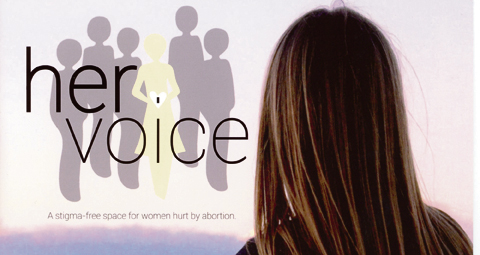BY Amanda Connelly | August 9 | ![]() 0 COMMENTS
0 COMMENTS ![]() print
print

Her Voice: A loving space to be heard and healed
Amanda Connelly speaks with Margaret Akers of Her Voice, a pro-life group aiming to give women a voice.
Abortion has become a topic frequently discussed in the media, particularly coming on the back of the Irish referendum on whether or not to repeal the Eighth Amendment to the Irish Constitution, and recent new laws on abortion in the US this year.
In Scotland, new group Her Voice has been set up in an attempt to give a voice to women that have had a negative experience surrounding their abortion.
Margaret Akers spoke of the recently founded Her Voice, which provides a space for women who have had an abortion that have afterwards struggled with the experience.
ARCH
Having been involved with the pro-life movement as a student at university, it was here she first met Margaret Cuthill, the founder of Abortion Recovery Care and Helpline (ARCH), who herself has had an abortion, and has continued to be interested in the perspectives of women who have struggled after having had an abortion.
Mrs Akers spoke of the need for a space where post-abortive women could share their stories and experiences without encountering hostility or stigma.
“We’re living in the time of the #MeToo movement and women are increasingly empowered to share their stories that previously they had no place to share, and didn’t feel comfortable sharing because of the environment they were in,” she said.
Inspiration
“This was really inspiring and I thought, ‘how can we do that for these women and give them the space to do it?’
“We had the idea for Her Voice essentially because we knew so many women that wanted to tell their stories but had no space to do so,” she explained.
“Occasionally you would hear of stories of women who have had really challenging experiences of abortion and following an abortion—you hear them in the media, but it’s very rare that a woman gets to tell the story on her own terms. Very often it’s met with hostility and stigma.”
Stigma
She noted that for those promoting abortion, comments such as ‘the only women who struggle after an abortion are people who already had mental health problems ahead of time,’ or that the majority of women do not have a negative experience surrounding their abortion.
“What happens is these women feel a great sense of stigma against speaking out, and they feel as though there’s no real space for them to do it in a way that they can do it on their own terms, in their own words, how they want to say it,” she said.
“Her Voice is trying to create a space where women could tell their stories all together. They won’t feel alone and they can have their voice magnified.”
Personal stories
The Her Voice team has spoken to a number of women who were interested in sharing their stories—some, like
Margaret and Allison, were willing to share more publicly, while Isabel and Ellie shared their own experiences anonymously, using pseudonyms.
Together, the stories have been compiled in Her Voice’s first publication, giving the women, as Mrs Akers said, ‘the perfect opportunity to put down their thoughts in writing and share without feeling as though they’re going to be put on the spot for it; they were very much in control of how their story was told and that was what was most important.’
“It was important to me that these women also had their voices heard, even though they’re a slightly dissenting voice,” she added.
Healing
Her Voice works mainly with women who have already sought counselling for their experience of abortion, and are at the stage in their healing process where they feel the need to share.
Mrs Akers hopes that Her Voice will have a space where people can listen to these women and learn from their experiences, as they’re ‘very telling experiences in a lot of cases.’
She noted that you have women who ‘weren’t properly counselled, you have women who were pressured by their partners, you have women who felt totally abandoned, and it breaks down this narrative of choice that exists in a pretty serious way and it’s important that those stories get told because it’s not often a lot of people are hearing.’
“Where Her Voice steps in is as a sort of megaphone of them sharing,” Mrs Akers said.
‘Long and slow process’
“As you can imagine, for women who have been through these things, it’s a long and slow process to come to a point where they first of all understand what they think about what happened and then are able to share it with others.
“We are primarily just there to be a space for them to say what they want to say, how they want to say it, and help them do that however they’re most comfortable.”
Her Voice’s first publication contains four testimonies, each with a different story to tell. Ellie had experience of an abusive relationship, driving her to have an abortion.
Margaret conceived under challenging circumstances and had had abortions before. Isabel was just 15 at the time of her abortion, and is sharing her story for the very first time.
Debate
“There’s a particular narrative that we hear in the media, even in the pro-life, pro-choice debate, it’s so dichotomous really,” Mrs Akers said.
“You hear campaign points on either side but so often the voices of women involved get lost—particularly the women who are involved with Her Voice.
“You have campaigns like Shout Your Abortion, which are places for women who haven’t had the negative experiences of abortion to come forward and say ‘I have no regrets.’
“You have the abortion campaigners saying the statistics just show that women don’t experience [hurt] the way that pro-life people would claim that they do.
“You hear all of this, and somehow these women who weren’t happy with what happened to them get drowned out in all the noise, and they’re in a particularly vulnerable position and they don’t have many people advocating for them.
“Now thankfully there are organisations like Abortion Recovery Care and Helpline and Rachel’s Vineyard that can help them heal but they don’t have anybody advocating for them in the public sphere, and so it was important to me and to everyone at Her Voice to be that advocacy voice, or actually, more rightly, to let them speak for themselves and help them put those words out there.
“They’ve got a legitimate thing to say in this conversation too, and they deserve to be heard as much as anybody else does.”
A place to talk
Mrs Akers hopes that Her Voice will become a space where women ‘feel safe coming to and talking about their experience.’
“I want this to be for women who haven’t had that positive experience; I want this to be the space for women who struggled, and in some cases struggled for years, to come and share that without feeling as though they will face stigma from the communities that they’re part of, and without feeling as though people are going to discount them because so often that’s what happens.
“My hope is that we can get more people to read these stories. More women who haven’t been able to come forward and share their side of the story can come forward and do that for those women who haven’t had a chance to heal.
“We hope to point them in the directions of people like ARCH and Rachel’s Vineyard who can provide that help and healing for them.
“If they’re not comfortable sharing their story that’s fine, but there is help for them and it’s important that we point them in the direction of that too—it’s so important.”
Existing services
She notes that while she wishes there were more services available to support women who have struggled following an abortion, the existing services ‘are really good and work very hard,’ including ARCH and Life in England which are secular organisations, and Rachel’s Vineyard which provides religious retreats for women.
“Unfortunately a lot of women don’t know where to find them and I would encourage people to share them,” she said.
“The abortion clinics in some cases, like BPAS and Marie Stopes, will offer counselling sessions to women following an abortion if they’ve struggled with that experience, but there are problems with that.
“You’re asking women to go back to the place where they experienced a particular trauma—very often they’re only offered two or three counselling sessions. The more we can get women the help that they need the better.”
Accessibility
Her Voice is designed to be as accessible and shareable as possible, so that women’s stories can be heard and shared.
Their initial publication contains the first four stories and there is a website where the stories are featured in an online format, and a blog function so people care share their own story.
Her Voice is also encouraging people to pledge to promise to listen to women who have had a negative experience of abortion, in order to challenge stigma and support the development of a safe space for women to share their stories.
To find out more, visit: www.hervoice.org.uk or Her Voice on Facebook at www.fb.com/promisetolisten










